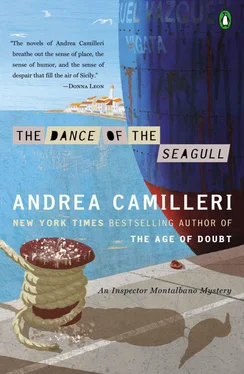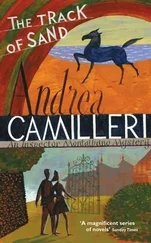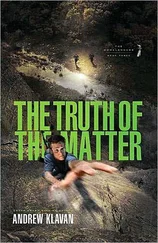But before doing this, they’d granted themselves another amusement . . .
Suddenly it all ended, perhaps because a gust of wind opened the windows again.
He found himself sitting on the stairs, eyes shut tight, face in his hands.
It was over. This was what he had so feared from the first moment he’d entered that room: that one reality would ineluctably superimpose itself on another. It wasn’t like a dream that comes back to you when you’re awake. No, it wasn’t something he’d already seen before, it was something entirely different, an aberration of reason, a momentary swerve, a short circuit that flung you into a world utterly foreign to you, as time scrambled the past, mixing events that happened on different days together into a single present . . .
Now he felt much calmer.
He opened his eyes and looked at the spot the seagull had pointed to with its beak.
There was a picture hanging on the wall, but he couldn’t quite tell what it depicted. It was too far away.
He stood up and went up to it. Four red roses. Painted as though photographed, horrendous. The kind one used to see on boxes of chocolates.
His right arm moved as if by itself, independent of his will. The hand took the picture off the wall and turned the frame around. There was nothing on the back, just the brown paper covering the reverse of the canvas. His hand spread its fingers, the painting fell to the floor, the glass shattered, the bottom part of the frame came off, and a white envelope popped out halfway. The inspector was not surprised. It seemed perfectly natural, like something he’d known all along. He bent down, picked it up, and put it in his pocket.
Now there was only one thing left for him to do: get the hell out of that house as fast as possible. He headed for the door and then stopped dead in his tracks.
Fingerprints!
He must have left hundreds in every room he entered!
Then immediately he almost started laughing. He didn’t give a flying fuck whether the fingerprints were found. They weren’t registered anywhere, whereas those of Carmona and Sorrentino were.
Before leaving the room, he couldn’t resist and went back and looked at the two used condoms on the floor near the table.
As soon as he got into the car, he happened to glance at his watch. And for a second, he thought it had broken.
Could it possibly be four o’clock? Was it possible he’d spent nearly three hours in that house without having the slightest sense of it?
The position of the sun, which was ducking in and out of the clouds, confirmed that the watch was running fine. What was the explanation?
What is this? What the hell is he thinking? So now he’s trying to convince himself that another weird thing happened inside Manzella’s house? Montalbano Two suddenly and rather angrily asked.
What other thing? Montalbano One immediately reacted, as if stung by a wasp.
This business about time. Absolutely nothing paranormal happened, nothing magical, nothing mysterious, no presences, time did not stop or stand still or similar bullshit. He simply stayed in there for three hours without noticing the time passing. So let’s drop this stuff about weird and uncanny events, because nothing unusual whatsoever happened inside that house.
Oh, no? Then how do you explain—
You want an explanation? Plain and brutal? He was already upset when he entered the house, his heart was pounding because he can’t tolerate violence anymore, or at least the image of violence he has in his own mind. Men become rather more sensitive to certain things when going through andropause.
You could have spared us the mention of andropause .
No, I can’t not talk about it, because it’s the reason for everything! Look, he practically saw what happened in there. Simple as that. It’s not the first time that’s happened to him. And he grafted the death of the seagull onto what he saw. Which spooked him just as much. That’s all. The only thing different is the way he reacted. Like an old man, with his emotions on his sleeve and tears always ready to spill. Which is not a good sign .
Everything you say is so damned trite! And how do you explain the fact that he found the envelope immediately?
Why, I suppose you think the seagull’s beak pointed to where the envelope was hidden? Come on! Give me a break! It was his policing instincts that led him there! If Catarella had searched the room, he might have taken a little longer, but he would have found it in the end, too!
Would you guys please quit bugging me? the inspector cut in. I have to drive, for Chrissakes! You practically made me run over that little kid there!
But he felt that, in the end, the discussion had done him good, put things into perspective. Since he didn’t feel the least bit hungry, he stopped at the first bar he came upon and downed a double espresso.

“Have Augello and the others left?”
“Yessir, Chief. Already a ’alf ’our ago already. An’ Signura Fazio brought the gun.”
“Go and put it in my car.”
He went into his office, took the envelope out of his pocket, and without even looking at it, slipped it into a drawer, which he then locked.
He didn’t want to be distracted by any new information. The most important thing for now was for Fazio to get to Palermo safe and sound.

The first call came in around five-thirty, from Mimì.
“Totò Monzillo sends greetings,” said Augello.
Monzillo was a colleague from Montelusa Central, a good cop.
“What does that mean?”
“What’s it supposed to mean, Salvo? It means Monzillo’s here with me in Fiacca. We ran into each other in the parking lot. He’s got four men with him.”
“And what’s he doing there?”
“He’s waiting for the ambulance with Fazio, so he can escort them to Palermo. Direct orders from Bonetti-Alderighi. So I think that means we can—”
“Return to Vigàta? Forget about it!”
“But what’s the use of us going along with them? To form a procession?”
“Yes.”
“Don’t you think that’s a little ridiculous?”
“Not in the least. You know about the metallic blue car, you know about Carmona, and you know why they want to kill Fazio, whereas Monzillo doesn’t know a goddamn thing.”
“You’re right,” said Augello.
The inspector had been counting on that very thing: that the commissioner, as was logical, would send an escort. That way, Carmona and his pal would realize almost at once that there were two police cars accompanying the ambulance and would almost certainly drop their plans. They were killers, not kamikazes, and were fond of their stinking lives. Montalbano felt a little less worried. And so he started signing papers.

“We’re heading off now. It’s exactly six o’clock,” said Mimì.
“Thanks. Have a good trip.”

“We’re halfway there, and everything’s going smoothly. Except that it’s raining a little.”

The fifth call, however, was late in coming. After twenty-five minutes of waiting, Montalbano started squirming nervously in his chair, and at one point his signature came out as an impenetrable scrawl. He got up, went over to the window, fired up a cigarette, and at that moment Mimì called.
Читать дальше













